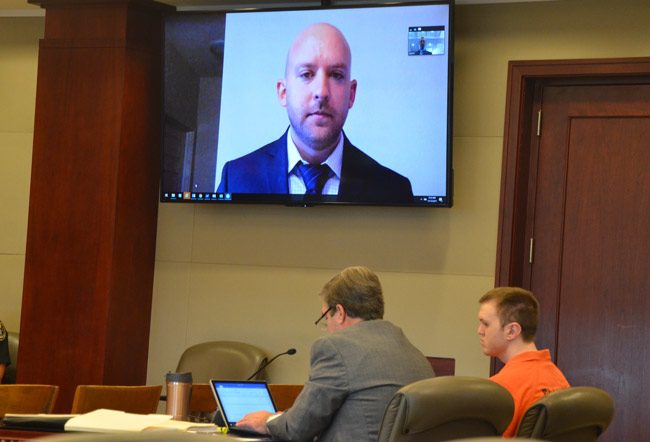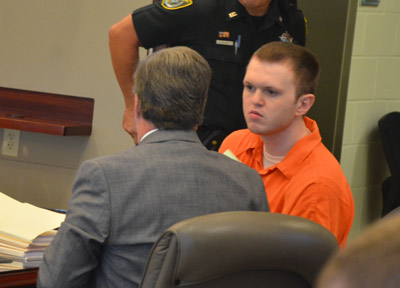
There is a basic rule familiar to most: a suspect in a crime has the right to remain silent, and the right to have an attorney present if and when speaking to police. Any information obtained in violation of that rule is not admissible in court, being the “fruit of a poisoned tree,” as the legal language goes. Those rights are guaranteed by the Fifth Amendment to the Constitution and backed up by solid precedent. It’s called the “exclusionary rule.”
On April 6, 2015, Florida Department of Law Enforcement agents Veronica Edwards and Travis Smith broke that rule when they interviewed Paul Dykes at the Flagler County jail. Dykes days before had been booked on charges of possession of child pornography. Detectives working on the case noticed that Dykes had been in communication with someone else in Palm Coast by various electronic means, and had gotten images of that woman raping a toddler, but they didn’t know who the woman was. The agent had gone to the jail to ask Dykes, and Dykes had volunteered the name and the address. At that moment, perhaps unwittingly, Dykes had become the prosecution’s most valuable asset—against himself.
That broke the case wide open: the house of the woman, Erin Vickers, was searched and electronic devices seized, which led not only to dozens of charges against her, including child rape, but to evidence the state is using to pursue dozens of additional charges against Dykes, also including child rape.
Vickers, 23, was found guilty of raping her daughter last September, and still faces numerous other charges. Dykes is to go on trial over some of the charges against him on Dec. 4. (The trial was supposed to begin this week, but was postponed.)
There is no argument from the prosecution that Dykes was illegally interviewed in jail that April. Bill Bookhammer, Dykes’s public defender, put forth a motion to suppress all the evidence gathered through search warrant as a result of that interview, which includes a lot—but not all—of the evidence the state has arrayed against Dykes in the upcoming trial. If that interview was illegal, then Bookhammer should have had little trouble winning his exclusionary rule motion, which he argued in court this morning.
He did not.
There is often a sense of inevitability—of fatalism—in many cases at the trial level, especially high-profile cases that draw a great deal of state resources to prosecute, and that happen to be built on a very large amount of evidence, however some of it may have been dubiously obtained. No matter what the defense throws up as objections, the conclusion is largely foregone. The momentum and scabrous nature of this case had it heading for trial no matter what, as no judge was going to “excuse somebody or give them a free pass”—in the words of the prosecution—if he could help it. In this case, the inevitability was framed in legal precedent.

And those allegations are what they are trying him for come Dec. 4, which alone, if he is found guilty, could result in a life sentence without parole, making the remaining dozens of charges moot if not for appeals of the more severe conviction.
In other words, much rode on Bookhammer’s motion to suppress: winning it would make the defense’s case much easier and unravel the prosecution’s case.
That’s when the sense of inevitability kicks in—when the question isn’t whether the search following the illegal interview was illegal, but how it would be determined to be legal by the prosecution and the judge, who was the ultimate arbiter on the motion.
Even in constitutional law—especially in constitutional law—nothing is absolute. There is a Fifth Amendment right against self-incrimination. But there are exceptions when it comes to the results of an illegal interview. It’s called the “inevitable discovery doctrine.”

(© FlaglerLive)
Yes, when Agent Whiteside’s colleagues interviewed Dykes at the jail (Whiteside himself was not available that day) he did so illegally and therefore the information obtained as a result was unconstitutionally acquired. But, Lewis argued before Judge J. David Walsh this morning, FDLE agents had been working on the case enough that it was just a matter of time before they zeroed in on Vickers and her home anyway. Figuring out who she was would happen regardless. Because it was “inevitable,” the evidence obtained in the search of her home should not be thrown out.
“There’s too much of this what if or maybe or could have or we would have,” Bookhammer said in his argument before the judge, referring again and again to the speculative assertions of the prosecution. “That’s too much to assume.” The agents after all were searching for laptops and phones: how could they be so certain that those “mobile” pieces of equipment would be at the house, Bookhammer asked.
But Bookhammer himself knew it was a long shot: until the trial was postponed, it was supposed to begin this morning, immediately after the motion to suppress, even though, had a judge ruled in favor of the defense, the prosecution would have had to rethink its strategy and rebuild its case on scantier evidence. That’s why Walsh’s ruling was no surprise. (Walsh retired in 2015 but is called in on senior-judge duty to fill in when other judges are not available. Judge Dennis Craig would normally have presided over the motion. He is presiding over a trial in DeLand this week and next. Walsh, in any case, had been the sitting judge when Dykes was first arraigned.)
After going over the cases the two sides siubmitted to justify their positions, Walsh found the prosecution had made “a reasonable showing” that the evidence against Dykes would have been discovered through Vickers whether he had spoken to an FDLE agent or not, as “there already was an intense investigation under way.”
He said the conclusion was “not speculative.” Therefore the evidence against Dykes is admissible “as an exception to the exclusionary rule.”
Dykes was in court throughout, looking ahead either because he was paying attention intently or because his mind may have gone elsewhere—as it sometimes does, according to his mother’s testimony last month. She herself sat in the courtroom, the only member of the public—other than a reporter—as she has throughout her son’s proceedings. At the end of the hearing Dykes shook hands with Bookhammer and was led away, back to the county jail. His next appearance will be without chains and in civilian clothes, when his trial begins on Dec. 4, with jury selection.
Correction: An earlier version of this story had incorrectly stated that Agent Whiteside had interviewed Dykes at the county jail, when in facet FDLE Agents Veronica Edwards and Travis Smith did so.





























I Be Erudite says
There are a couple of methods the law can use to overcome the Exclusionary Rule. One is Independent Sources, in other words sources not connect to the Fruit of the Poisoned Tree. Another is Inevitable Discovery.
Concerned Citizen says
I sincerely hope that regardless of procedure both of these nasty inhumane perverts go to jail for a very long time. They certainly both deserve it. The sad part is they will receive more protection than the toddler in her care had.
I understand that there are legal procedures in place and that when broken can result in a mistrial. Shame on the FDLE agent for breaking that rule. Kudos to the judge for not bowing to the defense and allowing this evidence to be used.
If this article was supposed to make me feel sympathy at all for these 2 it did quite the opposite. Both of these offenders need the maximum sentence with no parole or probation. They also need to register as sex predators and have monitoring when released.
There should be no allowance for any mental health BS on any of these 2. They knew what they were doing. Knew it was wrong and victimized a helpless toddler.
I can only hope the judge does the right thing this time. Florida Law provides very strict punishment for crimes of this nature. Please make the right decision and sentence accordingly.
Anonymous says
The cops always bend the rules to make their case right or wrong. Nobody wants pedophiles around, but you have to live by the constitution, it is there to protect us all from over zealous law Enforcement! The FDLE are some of the worst offenders of the rights of suspects. What was done in this case should be reversed on appeal if there is one, but no guarantees. The police and prosecutors are getting to powerful and are manipulating our judges. Soon they will be able to charge anybody for whatever they want and be able to put them away if something is not done to stop this trend.
Anonymous says
It is disgusting that the alleged crimes may have taken place, but it is more disgusting that law enforcement can bend the law and violation of bending the laws is upheld by the courts. Law enforcement should be held to a higher standard and know the laws, not do what they want because they would be above the law. The Law Enforcement agent needs to be fired and the matter needs to be appealed. When a citizen doesn’t know or understand the law they are not excused. This is not justice!
can'tfoolme says
It sounds as though this was not a formal inquisition but a visit to ask a simple question – to which the suspect volunteered the information.
Dan says
More disgusting than their alleged crime? What kind of person are you? Are you sure you know the facts of this case? My god what is this world coming to? A cop making an illegal interview is more grotesque than repeatedly molesting an infant? Smh